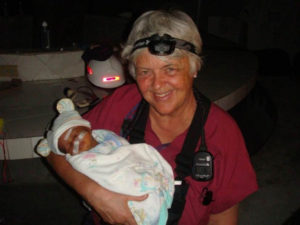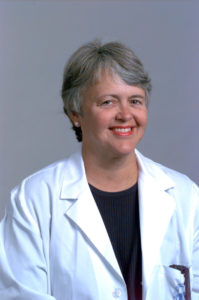By Kristin Davis
As a senior trauma surgeon at Massachusetts General Hospital, Susan Miller Briggs ’65 had rehearsed a day like April 15, 2013, many times.
It would begin with an alert from Boston emergency dispatchers: Prepare for a mass casualty incident. Then hundreds of medical professionals would mobilize.
Briggs had responded to enough manmade and natural disasters to know that a city the size of Boston would someday face its own major crisis – some kind of terrible accident, she thought.
But she was horrified when two pressure-cooker bombs exploded near the finish line of the Boston Marathon, killing three and injuring hundreds.
“I never thought it would be a bombing by people who are our own citizens,” Briggs said. “That’s the hardest part to take.”
Briggs grew up in Alexandria, Virginia, just a short train ride from Mary Washington. She always wanted to be a doctor, an interest most likely sparked by her physician grandfather.
“I knew I would never have a desk job or something that didn’t involve people,” Briggs said.
Medicine, she believed, was a practical, honorable profession, a way to spend her life in the service of others.
First, she decided, she would become a nurse, a test run to prove to herself that she was capable. It would also give her the means to work her way through medical school.
Mary Washington, where she majored in biology, provided her with the education and life experience that would carry her through the next arduous decade and beyond. “It was just a wonderful environment,” Briggs said. Without it, “I wouldn’t have been ready for the demands of medicine.”
She graduated from Loyola University Stritch School of Medicine in Illinois in 1974 and completed her residency in surgery at Massachusetts General. There, she became director of the International Trauma and Disaster Institute and founded the International Medicine Surgical Response Team.
In 1986, Briggs joined Project Hope, an international health care organization. Her first trip with the group was to a refugee camp in Rwanda, where one nurse provided care for thousands. It was life-changing.
She has since traveled to El Salvador, Armenia, China, Iran, Russia, Haiti, and many more sites to help victims of earthquakes, hurricanes, and transportation disasters. She was part of the first team from outside New York to reach Ground Zero after the Sept. 11, 2001, terrorist attacks.
“We never thought something like that would happen on our territory,” Briggs said.
Yet it happened again a dozen years later, this time even closer to home, near the finish line of the Boston Marathon. The bombing and its aftermath only strengthened her commitment to her profession and relief work, she said.
“I’m a general and trauma surgeon. It’s not fair to the next victim not to go on.”


